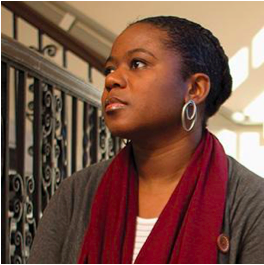
by Sony Prosper
I recently met with Dr. Kenvi Phillips to discuss advocacy and outreach in the context of a curator working in a research library. Kenvi comes from a rich cultural heritage and history background. She received a bachelor’s degree in History. She then earned a master’s degree in Public history and doctorate in history from Howard University in Washington D.C. She has worked in the Anheuser-Busch tour center, the National Park Service/National Archives for Black Women, the History Factory, the Moorland Spingarn Research Center, and now works as the first curator of Race and Ethnicity at the Schlesinger Library.
Located in Cambridge, Massachusetts, the Schlesinger Library is a research library at the Radcliffe Institute for Advanced Study, Harvard University. The library’s holdings date from the founding of the United States to the present and include more than 3200 manuscript collections, 100,000 volumes of books and periodicals, and films, photos, and audiovisual material. The material documents the lives of women of the past and present and reflect a strong collection of resources for research on the history of women in the United States.
Hired in 2016, Kenvi is leading the charge to ensure the Library’s collections are representative of a diverse group of women and reflective of the full American experience. The charge is part of an increased interest in diversity and inclusion on the Harvard campus in the past several years. A big part of her job is building relationships and trust on-campus, in the Northeast region, and across the country. She is constantly traveling to meet with potential donors, planning workshops and public programming events, and performing personal outreach.
Meeting with potential donors includes making them aware of the value of their material, offering suggestions for where to place material, and creating a relationship built on honesty, integrity, and respect. Part of making donors aware of the value of their material, Kenvi notes, is “including their voice and values in the way we classify collections in our care.” “We owe it to ourselves,” she continues, “our children, to do this work.” Touching on the memory of her grandparent’s materials being thrown away, Kenvi is also adamant on offering suggestions outside of Schlesinger Library. “Part of the job is making sure the donors place their material anywhere other than leaving them in a basement,” she remarks.
At the time of our conversation, Kenvi is working on multiple workshops, public programming events, and on-campus and off-campus outreach efforts. The first effort is a workshop in conjunction with Spelman College, a historically Black college and a global leader in the education of women of African descent in Atlanta. The second is a major public program in conjunction with the Museum of the National Center for Afro-American Artists in Boston. The third is a concerted effort to talk with Harvard alumni of color to fill institutional holes. The fourth is an effort to attend other events throughout the various centers, institutions and programs – the Hutchins Center, the Museum of Fine Arts, and the Boston Poet Laureate Program – in the Greater Boston area. Kenvi also performs personal outreach when attending local Juneteenth programs, public library programs, and other community programs.
When asked about the importance of outreach and advocacy, Kenvi harkens back to the 1960s and 1970s. She notes it was a period where questions like “why are we not talking about women’s history or black history” entered the mainstream. She continues “we partly did not talk about them because they were not present in the “mainstream” archive, we did not have the documents to support the existence of various groups, and so did not have the memory of these groups.” She continues, “it is important to collaborate directly with potential donors and place the evidence of their existence here at Schlesinger or elsewhere through outreach.”
When asked about a project she has recently done, Kenvi mentions the planning of “The Difficult Miracle: The Living Legacy of June Jordan,” a joint project with Columbia University. The project is a celebration and discussion with activists, poets, scholars, and the public of June Jordan’s work. The discussion will be followed by a poetry slam and reception. One of the goals for the event is to provide an opportunity for face to face contact with the community outside of academia. Hopefully, this event creates a space where “we can learn together,” Kenvi pauses, “and provide more awareness of our collections.”
